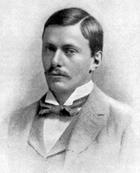
Edward Frederic Benson was born in Wellington College (Berkshire, England) in 1867. He was the son of the school principal, and later Archbishop of Canterbury, Edward White Benson, and Mary Sidgwick Benson ("Minnie"), described by William Gladstone as " the brightest woman in Europe ». Upon the death of her husband, Minnie would form a "Boston marriage" with Lucy Tait, daughter of the former Archbishop of Canterbury. Benson was the brother of a lineage of writers: A. C. Benson, Robert Hugh Benson and Margaret Benson, who was also an Egyptologist. It is claimed that the three brothers were homosexuals, including E. F. Benson; In fact, none of them got married. He had two other brothers who died young. In his youth, E. F. Benson was an excellent athlete and represented England in various international championships in figure skating. He was also a precocious and prolific writer, and published his first book while still a student. Although he liked to consider himself a writer of horror stories, today he is best known for his famous series of novels starring the two heroines of the very British rural bourgeoisie, Elizabeth Mapp and Emmeline «Lucia» Lucas, Mapp and Lucia, who wrote already at a fairly advanced age and that constitute one of the most notable examples of English social comedy of the first part of the 20th century. The series consists of six novels, Queen Lucy (1920), Miss Mapp Mapp (1922), Lucia in London (1927), Mapp and Lucia (1931), Lucia's Progress (1935) and Trouble for Lucia (1939), as well as two short stories, "The Male Impersonator," which traditionally appears as an appendix to the novel Miss Mapp, and "Desirable Residences." Benson, a Victorian writer, like M. R. James, is also well known for his ghost stories, which frequently appear in anthologies of the genre. In them, Benson avoids the typical Gothic scenarios, looking for more everyday areas. It is worth noting "The confession of Charles Linkworth", "The night terror" or "A story about an empty house". E. F. Benson died in London in 1940.




